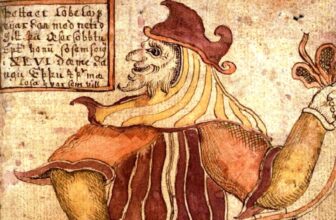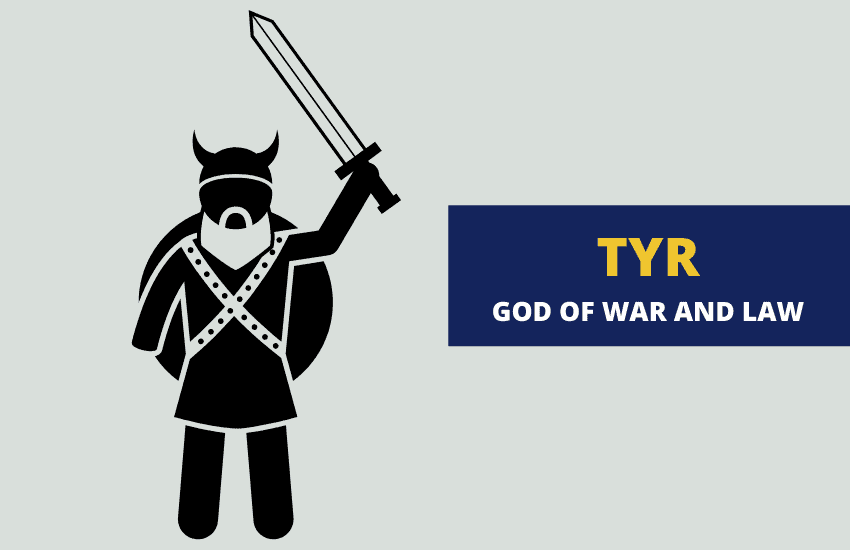
Table of Contents
Týr (Tyr, Tiw, or Ziu in Old High German) was a Nordic and Germanic god of war. He was the most popular god among most ancient Germanic tribes until the All-Father god Odin (or Wotan) took that mantle from him. Even after that, Tyr remained a favorite of many of the war-like Germanic and Norse tribes. It’s from him that we get the the English name for the day Tuesday.
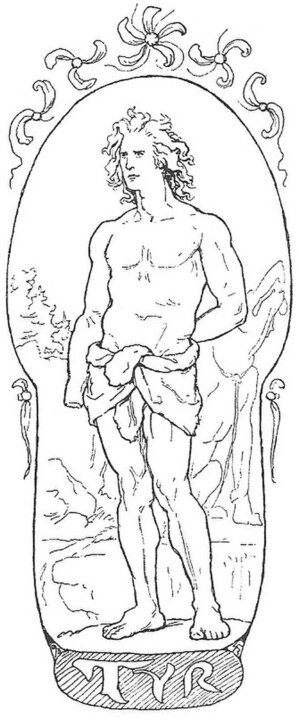
Who is Týr?
In some legends, Tyr is a son of Odin while in others he is depicted as a son of the giant Hymir. Regardless of his exact origin, Tyr was beloved by most people. Unlike the war gods in most other countries, Tyr wasn’t viewed as an “evil” god. On the contrary, Tyr was believed to have been the bravest of all the Asgard gods, as well as a just and fair god who settled peace treaties and negotiations.
God of Justice
Tyr may have been a god of war but the war-like Germanic and Norse people viewed war quite seriously. They believed that there was justice in war and that peace negotiations and treaties had to be respected. They paid extra attention to war-time oaths and vows, and invoked Tyr’s name when it came to upholding such oaths.
So, while he wasn’t officially a god of justice or law – that title belonged to Forseti – Tyr was worshipped as such in all matters related to war.
Tyr’s Hand and Fenrir’s Chaining
One of the most famous myths involving Tyr doesn’t actually have anything to do with war. However, it reinforces the god’s bravery and just nature. It also involves Loki’s son – the giant wolf Fenrir.
- The prophecy about Frenrir
A son of Loki and the giantess Angrboda, Fenrir was prophesied to kill Odin during Ragnarok. Fearful of that destiny, Odin decided that Fenrir had to be chained in Valhalla once the wolf started growing too big.
Tyr had helped raise the wolf, however, and felt very warmly toward him. Still, he knew that the wolf had to be chained so he agreed to help.
- Chaining Fenrir
Because Fenrir was too strong and dangerous to fight head-on, the gods decided to trick him. They lied to Fenrir that they wanted his help to try and test some magical bonds fashioned by the dwarves. The gods told Fenrir they want to chain him and see if he could break through the bonds. Even if he couldn’t, they promised to let him go.
- Tyr sacrifices his arm
Suspicious of treachery, Fenrir agreed but added a condition – Tyr was to put his right arm in the mouth of the beast as a guarantee. Tyr also agreed, realizing that he’d almost certainly lose his arm in the process. The gods had to try three different magical bonds until they eventually managed to chain Fenrir securely. Realizing he’d been tricked, the giant wolf bit Tyr’s right hand off.
- Loki makes fun of Tyr’s arm
Amusingly, Loki pokes fun of Tyr during one of Ægir’s parties for this incident. There, the drunken Loki was insulting all the goddesses, pointing ou their unfaithfulness, until Tyr eventually stepped in and told him to be quiet. However, although drunk, Loki was quick to answer, telling Tyr, “You can’t be the right hand of justice among the people” making fun of Tyr’s missing right hand.
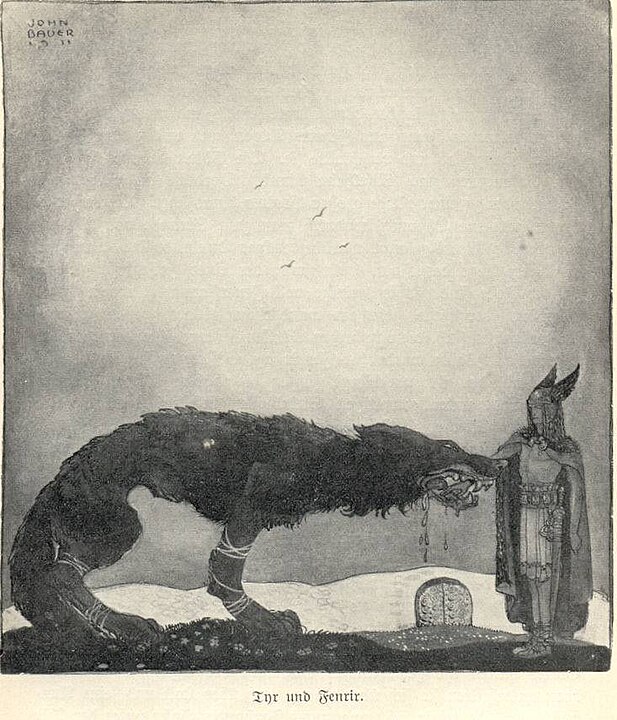
- Symbolism of Tyr’s sacrifice
By sacrificing his arm, Tyr proves that he is the god of law and justice. He went so far as to lose his arm to uphold justice, thereby legalizing what would have been, in the words of the scholar Georges Dumezil, “pure fraud” on the part of the gods.
There’s also a parallel to be drawn between Tyr’s arm and Odin’s eye. Odin, as the god of wisdom and knowledge, sacrificed an eye to Mimir in the pursuit of wisdom. In this way, the loss of his right arm symbolizes Tyr’s commitment to justice and fairness and speaks volumes about his character.
Tyr’s Death by Hellhound
Tyr definitely didn’t have luck when it came to canines or Loki’s children. The god of war was prophesied to die during Ragnarok in a battle against Garm – the hound of the goddess of the underworld Hel, herself also a child of Loki and Angrboda. Garm was said to be the most evil creature and Tyr and the hound are said to kill each other during the final battle.
Symbols and Symbolism of Týr
As a god of war, justice, and oaths, Tyr was beloved by most Germanic warriors and Scandinavian vikings. His name was often called when people were urged to uphold their oaths and maintain peace treaties. He was also a symbol of bravery with the story of Tyr and Fenrir showcasing both his selflessness and his honor in upholding his oath.
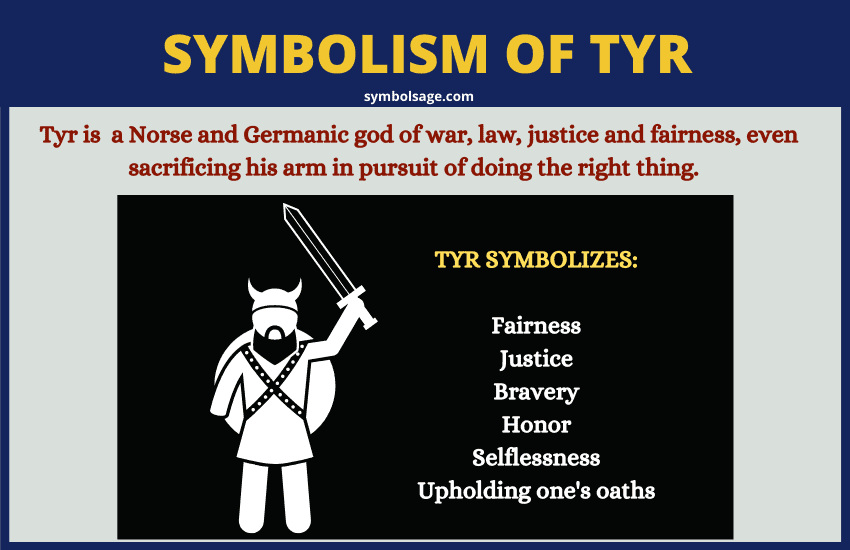
Importance of Týr in Modern Culture
The war gods from most cultures and legends are usually remembered through time, and play a part in modern culture. Unfortunately, that’s not the case with Tyr. Tyr was popular during Dark Ages in Europe and even through the Victorian Era but modern pop-culture hasn’t found much use of him yet.
Interestingly enough, Tyr is the namesake of Tuesday – Tyr’s Day or Tiw’s Day. The day was first named after the Roman god of war Mars (Dies Martis)but became popular as Tiw’s Day across Europe.
Wrapping Up
Tyr’s role in Norse mythology is small and not many myths about him survive. However, the evidence suggests that Tyr was an important god to the Norse and Germanic people. He was an indispensable figure and highly revered as a symbol of justice, bravery, honor and war.






